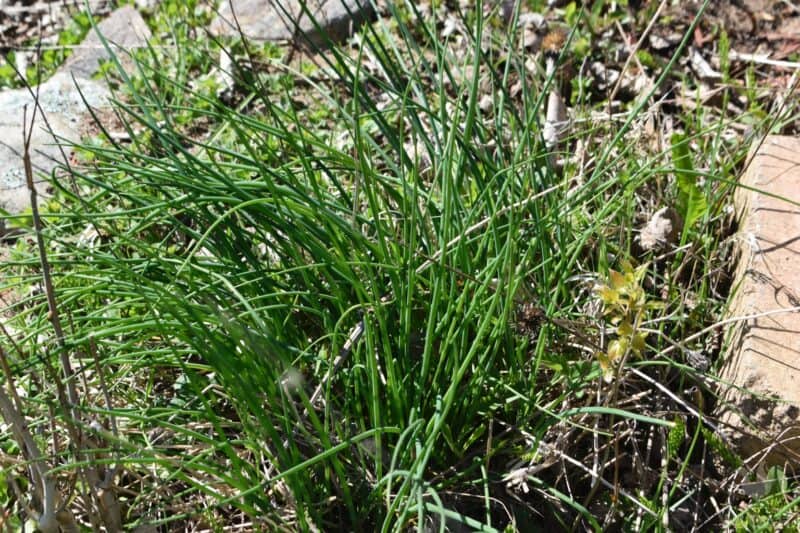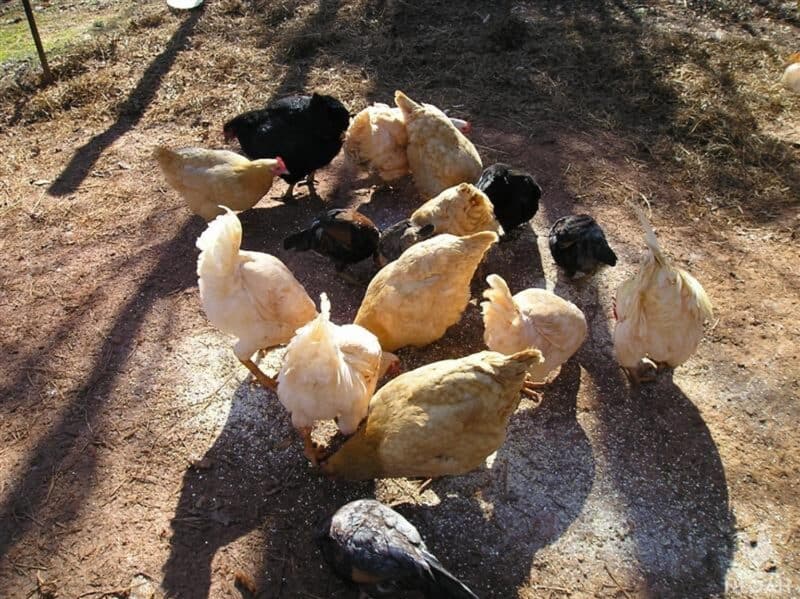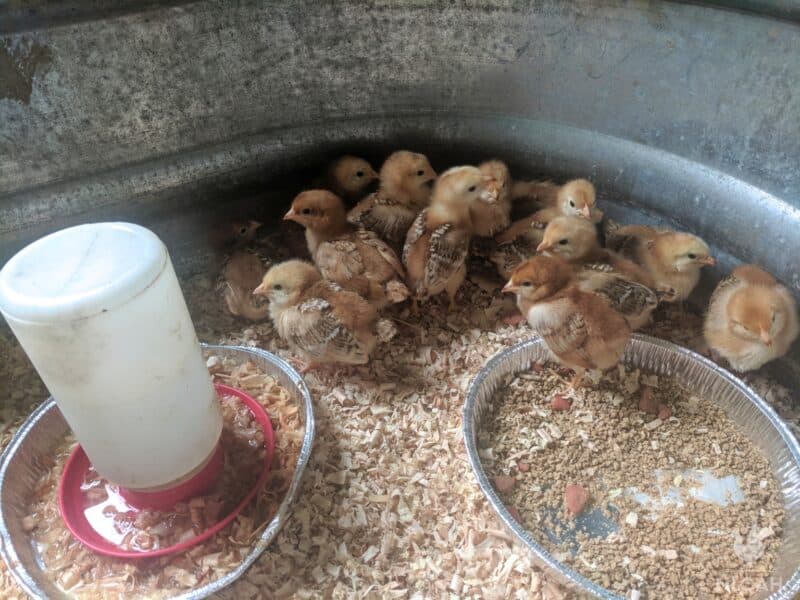If you have owned chickens for any length of time, you already know that they will eat pretty much anything. There is hardly any plant, bug, fruit or veggie that is safe from them!

This sometimes leads chickens to get into trouble by eating something that they shouldn’t, and sometimes unwitting owners feed their flock things they really shouldn’t have.
Worryingly, some of these harmful vegetables are surprising because they are quite common, and you’ll need to know what they are. How about chives? Can chickens have chives?
Yes, you can let your chickens eat chives. But, chives contain the same hazardous compounds in onions and other Allium plants that are toxic to chickens because they disrupt red blood cells and can cause Heinz body anemia. It is best to give your chickens chives only sparingly!
Chives, onions and other veggies in the allium genus are all generally bad for chickens, with some being worse than others.
But, on the other hand, there is a lot of anecdotal evidence of keepers giving their chickens chives with no issues, and even a few scientific studies showing they do have benefits.
I know lots of farmers in my neck of the woods that use garlic, another Allium plant, as a natural de-wormer when required, but they make it a point to avoid feeding their birds onions otherwise.
It is a contentious subject, but keep reading and we will tell you everything you need to know about the possible dangers chives pose to your chickens.

Chives are Supposedly Toxic to Chickens
Contrary to popular assertion, chives are definitely toxic to chickens, or at least technically so.
Tiny quantities might not cause any harm, but then again the concentration of the compounds we are worried about varies in different species and individual plants.
The compounds I’m referring to, sulfoxides and disulfides, are dangerous because they can cause anemia through the damage and degradation of red blood cells when ingested in high enough quantities.
However, it appears that chickens would have to eat a lot of chives for there to be any risk.
| 100g Chives | Amount |
|---|---|
| Water | 90.6g |
| Calories | 30 kcal |
| Protein | 3.27g |
| Total Fat | 0.73g |
| Ash | 1g |
| Total Carbohydrates | 4.35g |
| – Dietary Fiber | 2.5g |
| – Sugars | 1.85g |
| Calcium, Ca | 92mg |
| Iron, Fe | 1.6mg |
| Magnesium, Mg | 42mg |
| Phosphorus, P | 58mg |
| Potassium, K | 296mg |
| Sodium, Na | 3mg |
| Zinc, Zn | 0.56mg |
| Copper, Cu | 0.157mg |
| Manganese, Mn | 0.373mg |
| Selenium, Se | 0.9µg |
| Vitamin C | 58.1mg |
| Thiamin | 0.078mg |
| Riboflavin | 0.115mg |
| Niacin | 0.647mg |
| Pantothenic acid | 0.324mg |
| Vitamin B-6 | 0.138mg |
| Folate, total | 105µg |
| Vitamin A, RAE | 218µg |
| Carotene, beta | 2610µg |
| Vitamin E | 0.21mg |
| Vitamin K | 213µg |
| Fatty acids, total saturated | 0.146g |
| Fatty acids, total monounsaturated | 0.095g |
| Fatty acids, total polyunsaturated | 0.267g |
Chives are Closely Related to Onions, Also Bad for Chickens
Chives are commonly said to be a type of onion, and though they aren’t they are indeed closely related, both being in the genus allium.
Vegetables in this genus all, to one degree or another, contain the harmful compounds mentioned above.
You’ve probably heard the admonishment that you shouldn’t feed your chickens onions, and that’s the reason why. The same thing applies to chives, of course.
The major problem with feeding chickens these vegetables is that the effects might not be immediately noticeable.
Neither veggie is, typically, as instantly lethal to chickens as some seriously poisonous plants like poison mushrooms or henbane are.
The harmful compounds can build up in the body of the chicken over time, slowly degrading their health via disrupting their blood supply and, eventually, killing them.
Eating chives sparingly or every once in a while might not affect your chickens in the least, but by continually ingesting them, or eating large quantities it could cause fatal complications for the poor bird.
What Happens to Chickens that Eat Too Many Chives?
Chickens that eat a lot of chives or other related plants, or have been eating them for a long period of time may start to show symptoms. They typically don’t just drop dead after nibbling on them.
Common symptoms of chive toxicity include significant diarrhea, lethargy, depression, and overall weakness. Serious symptoms include a significant loss of appetite, difficulty breathing and, once anemia has truly set in, pale or blue combs and wattles.
Anemia is of course the most serious concern and is very difficult to effectively treat in chickens.
It is especially insidious when brought on by chives and other allium plants because it can degrade the red blood cells to the point where they are completely unable to perform the vital role of carrying oxygen to tissues and organs in the chicken’s body.
Though the condition it can be treated by a skilled vet that is aware of the problem, it is often fatal once it progresses to a certain point, and it is easy to get to that point if you don’t know what you’re doing and are allowing your chickens to eat chives or you are deliberately feeding chives to them.
Can Chickens Safely Eat Raw Chives?
Yes, raw chives are nominally safe for chickens. Few if any keepers have reported ill effects from letting their chickens eat a few chives, but they don’t feed them on a regular basis either.
Can Chickens Safely Eat Cooked Chives?
Yes. Cooking chives will only slightly degrade any of the compounds which cause harm to chickens, but they don’t contain that many to begin with.
Can Chickens Safely Eat Dried Chives?
Yes. But know that all chives, and all forms of chives, are potentially harmful to chickens in large amounts: Cooked, fresh, ground, dehydrated, whatever.
Eating Chives Can Possibly Taint Eggs and Meat
Even if chickens are eating chives or other related veggies that don’t contain seriously dangerous levels of the compounds that can damage their blood cells, there are other less serious but still undesirable side effects that they can cause.
Namely, chimes are notorious for tainting the flavor of your chicken’s eggs and meat. As you might guess, this is known to impart the eggs or meat with a nasty, sulfurous flavor.
I promise this is nothing you or your family want to experience for yourselves, and if you are selling your chickens’ products commercially this could prove to be disastrous.
Interestingly, the compounds that taint the meat and eggs in this way are the same ones that give chives that typical oniony smell that makes your nose wrinkle when you cut them. There is no real way to eliminate the side effect.
Never Feed Anything to Chickens that Has Been Prepared with Chives!
I mentioned the cooking of chives above briefly, but you must be cautious when feeding chives to chickens that have been prepared with any other ingredients or used as an ingredient in a dish.
In addition to the obvious danger from the chives themselves, many prepared foods that you and I like to eat are still bad for chickens because they have things like sugar, salt, excess oils, dairy products, and the like.
These ingredients can cause high blood pressure, salt poisoning, sour crop, and things like that but in conjunction with chives and the havoc that they cause in your chicken’s bloodstream, the effects could be even worse.
If you care about your chickens, you only need to give them wholesome, safe foods that they enjoy.
You might think you are being kind to them by sharing some of your favorite dishes with them, but this is misguided.

Chives Can be Dangerous for Baby Chicks
It should be no surprise that if something is potentially dangerous for adult chickens it is doubly dangerous for chicks.
Chicks are extremely sensitive to all toxins, and considering they have far less body mass than adult chickens even a few bites of chives might be enough to make them sick or possibly kill them.
Accordingly, you should never allow chicks to eat anything that could possibly contain chives, and obviously, never give them any on purpose.
What Should You Do if Your Chicken Eats Too Many Chives?
If you suspect that chickens have eaten too many chives you don’t need to panic but you do need to pay attention.
Keep a close eye on all birds that ate the chives and watch for any changes in their behavior or appearance. Refer to the symptoms above in the previous section.
If your birds are showing no obvious signs of distress, there’s probably nothing to worry about. Just take whatever steps necessary to ensure that they don’t get anymore.
However, if you notice symptoms, particularly if the bird is showing difficulty breathing or standing take them to a vet as quickly as possible.
If you act fast, and have a little luck on your side, allium toxicity can probably be treated. But in cases of acute poisoning or a delayed response, chronic injury or death is likely to result.
Tom has lived and worked on farms and homesteads from the Carolinas to Kentucky and beyond. He is passionate about helping people prepare for tough times by embracing lifestyles of self-sufficiency.
